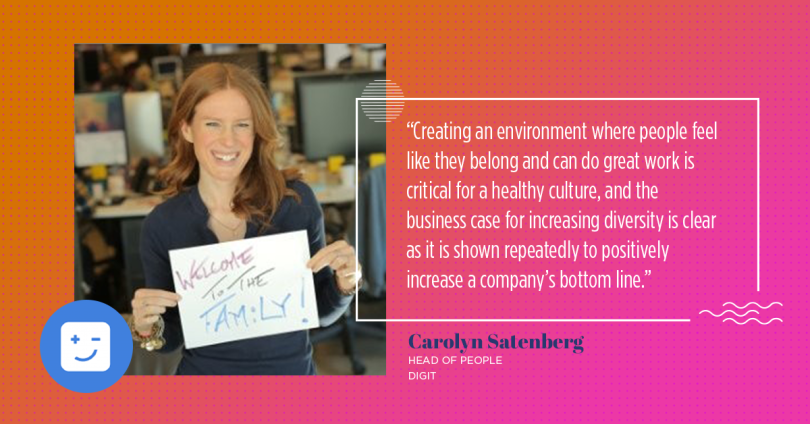
Workplace diversity training, like unconscious and implicit bias workshops, have been around for nearly a century, with major spikes in popularity following civil rights movements like we’re seeing today.
Yet studies have implied unconscious bias training doesn’t make a lasting impact.
“There is ample evidence that [diversity] training alone does not change attitudes or behavior, or not by much and not for long,” wrote Frank Dobbin and Alexandra Kalev in a whitepaper titled “Why Doesn’t Diversity Training Work?”
That’s because DEI efforts can’t stop with training, according to experts from eight local companies.
“Unconscious bias training is not effective on its own because awareness about bias is not enough to change or reduce biased behavior,” Mariah Driver, the head of diversity, equity and inclusion at Webflow, said.
While Driver and the following leaders agree that unconscious bias training is necessary, it’s what happens after, in hiring for instance, that matters most.

Identifying a Goal
“Whether or not a company needs unconscious bias training ultimately depends on what the company is trying to accomplish. If the goal is to increase awareness about unconscious bias, then yes, the training is necessary. But if the goal is to reduce the expression of bias, then unconscious bias training is not enough.
“Unconscious bias training is not effective on its own because awareness about bias is not enough to change or reduce biased behavior. This is why, despite the active effort to combat unconscious bias and reduce inequalities in the workplace, manager and senior executive roles in the private sector are still 86 percent white and 70 percent male. In order to reduce biased behavior and the inequitable outcomes it produces, companies need to pair bias awareness with operational changes that prevent the expression of bias in key decision-making processes such as hiring and promotion.”
Mariah Driver is head of diversity, equity and inclusion at website creation platform, Webflow.

Creating Infrastructure to Support Desired Behaviors
“Unconscious or implicit bias training creates awareness around a very important aspect of how humans interact with our environment, whether that be in the mode of internal collaboration or hiring. Our brains are hard-wired to make shortcuts, and the first step to creating an inclusive environment is that people accept that premise.
“However, training does not translate to behavior change. So, training on its own is not sufficient. You have to design processes, systems and structures that are embedded into how you work, like performance feedback, hiring and promotions. These checks and balances, when done right, provide helpful nudges and reminders to be more intentional rather than automatic during important decisions like hiring. Launching an unconscious and implicit bias training without designing the rest of the infrastructure to support the right behavior is like signing up for a marathon and quitting after the first mile.”
Liz Kosinski is VP of people at the fraud prevention provider Sift.

Raising Awareness First
“All of us have unconscious, and in some cases, conscious biases. The key to managing biases is awareness, and when effectively managed, we can create a more positive, diverse and inclusive workplace. Unconscious bias training is extremely effective in helping people come to terms with these hidden biases and offers tools to help managers and employees keep their biases in check. When a company encourages employees, especially managers, to take these trainings, it results in a shared understanding of how unconscious bias can negatively impact not only morale and employee engagement but also the bottom line of the business.
“At PitchBook, we have rolled out unconscious bias and inclusive leadership training to 130 employees, including all people managers. We also require interview training, which includes how to mitigate unconscious bias negatively impacting hiring, for any employee who participates in our interview process. All of the training has been well received, and PitchBook will continue to offer these trainings to employees. We should all advocate for our organizations to offer this training.”
Mary Catherine Wolfe serves as director of talent acquisition for financial market platform PitchBook.

Establishing a Healthy Culture
“Diversity and inclusion should be a main focus of companies for two important reasons: Creating an environment where people feel like they belong and can do great work is critical for a healthy culture, and the business case for increasing diversity is clear, as it is shown repeatedly to positively increase a company’s bottom line.
“At Digit, we believe that a diverse and inclusive workplace enables us to think bigger, innovate further and faster, and better represent and serve our customers. Because of these points, we invest a lot of money into increasing diversity, inclusion and belonging within the organization. Unconscious bias can hinder any and all diversity and inclusion efforts, impede company success and stall innovation. We’re all biased; to be human is to be biased. But, even a tiny bit of bias can have big consequences in the workplace. This bias is most harmful when making people decisions: recruitment, performance management, promotion and career advancement, team dynamics and culture fostering. To ensure the most equitable and inclusive work environment where team members can thrive, companies need to educate employees on what unconscious bias is, how it shows up at work and how to actively counteract unconscious bias in the workplace.”
Carolyn Satenberg leads the people operations team for Digit, a financial solutions provider.

Developing Consistency and Fairness
“Unconscious bias training is a great tool to help people increase their self-awareness and better understand how they process information. Everyone has biases. By understanding your own biases, you can adopt a more fair, consistent approach to everything you do. This helps build up your trust and credibility with others, creating healthier working relationships. The real work comes after the training when people need to make the conscious effort to make a change. A tool is only effective once it’s been properly applied. Driving change is a shared responsibility across the organization, and there needs to be a continued commitment in order to see a behavioral and attitudinal shift within a company.”
Jenn Reynolds is the senior people operations business partner at Tonal, a virtual fitness provider.

Impacting Recruitment, Management and Team Dynamics
“We are all subject to unconscious bias, also known as implicit bias, in one way or another. It is important for the company to provide unconscious training to its managers and employees because unconscious bias can have a big impact on people-related decisions, especially when it comes to recruitment, promotion, performance management and team dynamics. The more we are aware of this, the more we can mitigate bias in the workplace. Additionally, the unconscious training can contribute to a more inclusive culture in which all employees can thrive and add value.”
Carina Vo is the director of HR at Tapjoy, a mobile advertising and app monetization solution.

Supporting Everyone Across the Organization
“When we talk about unconscious bias, it is important to understand how plural the world and our population are. The plurality is present in every nation, in every company, and it leads to an important increase in the following years. As a reflection of this diversity, all companies should embrace and provide support for diversity on a daily basis.
“For Avenue Code, this is more than crucial to make our business bigger with quality and respect. As an example of our practices as a company, we have an ideology called #OneAvenueCode. The goals are to support our team diversity and include everyone, as they are unique and responsible for bringing essential qualities to the table. Given the multidiverse world we are in, we have more than numbers to understand that unconscious bias is part of our core. We have great deliveries, diverse teams and interaction training to make sure that we support our leaders, recruiters and each member of the organization in and outside of our walls.”
Alexandre Barbosa leads people development at IT consulting agency Avenue Code.

Fueling Adaptability Through Inclusiveness
“Ultimately, the key to a company surviving and thriving in a volatile, changing environment is the capacity to adapt. Adaptive capacity is a function of the company being able to collaborate well, communicate effectively and have all the members of the team contribute fully. When we display bias, even unconsciously, we erode the organization's opportunity to benefit from the inclusive contribution of all its members.”
Rich Vincent is the head of talent and development at Knotel, a flexible workspace platform.



